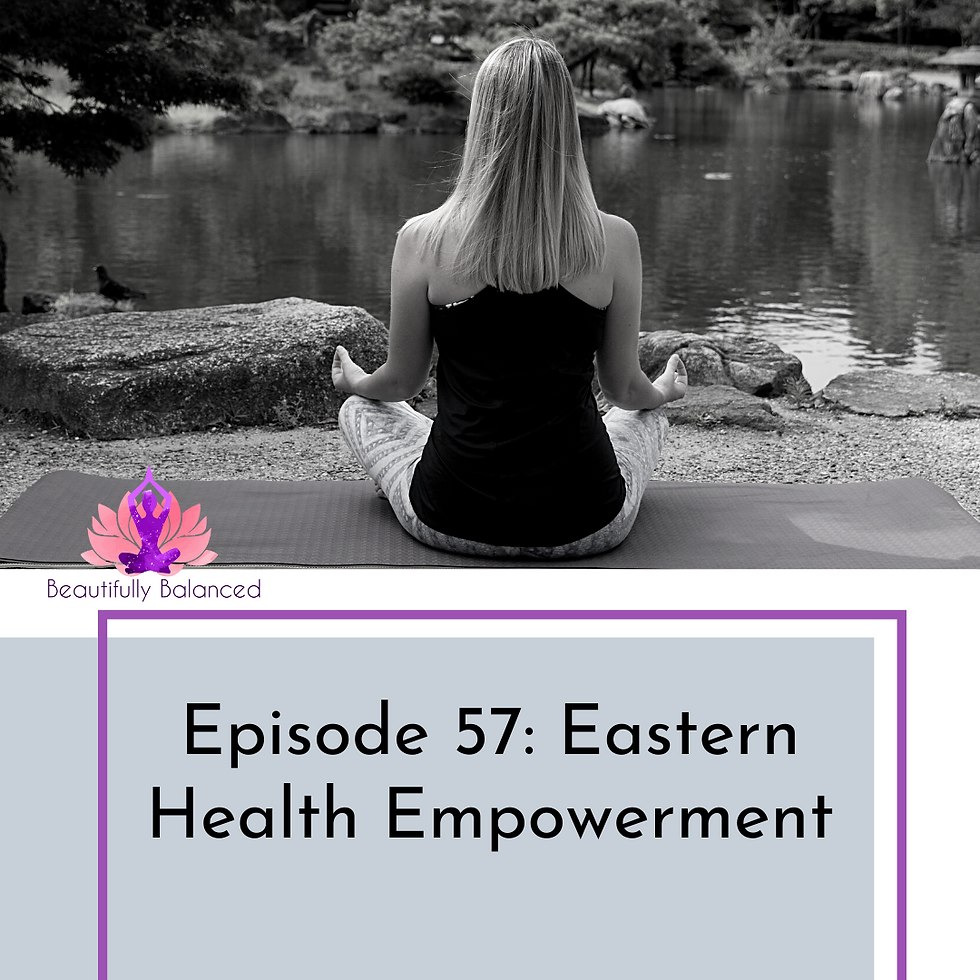Episode 57: Eastern Health Empowerment
- Samantha Dinnage
- May 18, 2022
- 5 min read

It's been 7 years since I started my journey to understand eastern health approaches after feeling sick, lost and frustrated. In the east, the mind and body are seen as two sides of the same coin. In the past I only thought that something physical must be ‘broken’ and that getting a disease was only down to bad luck or genetics.
Read on to discover:
⭐ Why health is more than being free from disease
⭐ The 6 Ayurvedic stages of disease
⭐ The difference between preventative and symptomatic care
⭐ The need to create space to understand yourself more deeply
⭐ That you don't need an overwhelming life overhaul to start to improve your health
In the west, here in the UK we often wait until our body is shouting at us in pain and discomfort before we finally book an appointment to see the GP. We may then be referred to a specialist depending on our particular body part or mental concern. We often view each body part separately, rather than looking at our being as the interconnected web that it is. Our bodies are often treated like a mechanical car or a computer, when it is so much more complex than thatIn recent years it's been great to see more light shined on mental health, although it can still be seen as a taboo subject. When a friend has a cold or a broken leg we often find this much easier to relate to than mental discomfort. Although in our busy, hectic world, many of us experience high levels of stress along with anxiety and depression. In the past, I never thought that a physical illness could be caused by mental and emotional factors. It took me a long time to realise that a lot of my personal health concerns including tiredness and exhaustion were linked to my mental patterns which in turn also impacted my choices and behaviours.
In eastern healthcare systems such as Ayurveda and traditional Chinese medicine that have been around for thousands of years, they tend to look at the person as a whole. Taking into consideration a person's natural tendencies, their lifestyle, their personality, their body type, their life experiences and passions in life, alongside their body ailments and mental challenges. Ayurveda has been used for generations in India and still remains a large part of their culture, I've spoken about it many times, it is known as the science of life. In Ayurveda they believe disease is created when imbalance occurs, by this I mean by who we naturally are isn't aligned with how we are showing up in the world. Therefore, when we come back to our true selves, we can feel more vibrant and healthy. For example, if we are a creative person who enjoys lots of freedom, having rigid rules and structure will be stressful and create tension, but also if they had no boundaries at all this person may feel lost and overwhelmed. There is always a balance to be found.
Ayurveda explains health as so much more than not having disease. One way it explains health relates to having a balanced digestion, balanced tissues (including our blood, muscles, bones at fat), balanced excretion, normal functioning senses and a happy, satisfied mind and soul. Enabling us to ultimately live in balance with our natural mind, body constitution- also known as doshas, vata, pitta and kapha, we can be a mix of all three. Being aware of our dosha's can empower us to understand ourselves more deeply.
Keep your eye out for a blog coming soon explaining the dosha's in more detail!
Ayurveda believes that disease occurs when we are out of balance, when our mental and physical toxins begin to build up. We often ignore the messages our body is sending us that something may not be right and continue to do the same things, in hope that the pain might go away on its own. In this eastern perspective of Ayurveda, there are 6 stages of disease helping us to recognise the symptoms early enough before they progress into chronic illness or disease.
Stage 1- accumulation, when a dosha may increase and go out of balance.
Stage 2- aggravation, this continues to increase, we may notice physical symptoms such as acid reflux.
Stage 3- Spread/ overflow, the dosha spreads it's way into the body taking over weak tissues or organs, we may experience further symptoms such as rashes or fevers.
Stage 4- The dosha becomes lodged, we may really notice symptoms screaming at us at this stage as our body is so out of balance and disease is stating to take place.
Stage 5- Manifestation- We will be feeling very unwell by this stage.
Stage 6- Maturation- This is when our areas of pain may begin to degenerate over time. For example this could be a long-term concern that ends up needing to be replaced such as a joint or bone.
Ayurveda and other eastern cultures are all about preventative healthcare and identifying when something is out of balance early on before it escalates into something more serious. From the food that we eat, the environment we live in, the people we surround ourselves, these are all factors which are having an impact on our wellbeing. Worlds apart from the 'one size fits all' approach that is often seen here in the UK. Each person is so different and all our needs vary greatly, it is adaptive to work with our changing needs.
When we visit the GP here in the UK, we are often given pharmaceutical medicines to alleviate our symptoms, a quick solution after a quick appointment. When we realise that many of the concerns GP's see are stress related and simple lifestyle changes can resolve these issues and get to the root of the concern, rather than simply applying a plaster or band aid for a quick fix solution. I'm sure many of us can relate to going to the GP and they can't find anything wrong, yet we just don't feel ourselves. We may not feel healthy, but we can feel stuck and unsure what to do. We can start to choose small lifestyle changes to change the way we feel on a daily basis, for example we can choose to eat something to help us feel satisfied, or something not as healthy. Or we could choose to go to bed earlier, or to watch that extra episode on Netflix.
When we change our approach from things we should do, to could do, we can help to make small changes step by step to improve our health and feel better. Choosing more of what helps us to feel balanced really can make a huge difference to how we feel.
But how do we know what balance is for us and what choices we should be making?
Seeing an Ayurvedic health coach or doctor can fast forward this process for us and enable us to gain more self awareness. One of the key steps is about creating that space and pausing to check in with ourselves to see how we are really feeling, moving away from distractions such as our phones to observe our inner self. It's also important to recognise that our self talk and the way we think consistently has a huge impact on our health and influences our choices and behaviours. If we can become more aware of our thoughts and emotional tendencies we can begin to feel more balanced and happy.
When our energy is higher we can do more good in the world, we can be of more service to family, friends and the community and we can share our own unique skills and talents (yes you do have them even if you’re not sure what they are right now) for the greater good. Surely that’s what we are here to do rather than muddle through the day!
If you would like to listen to the full podcast for this episode, click here. I would love to hear your thoughts.
I hope you have enjoyed reading,
Sam x























Comments